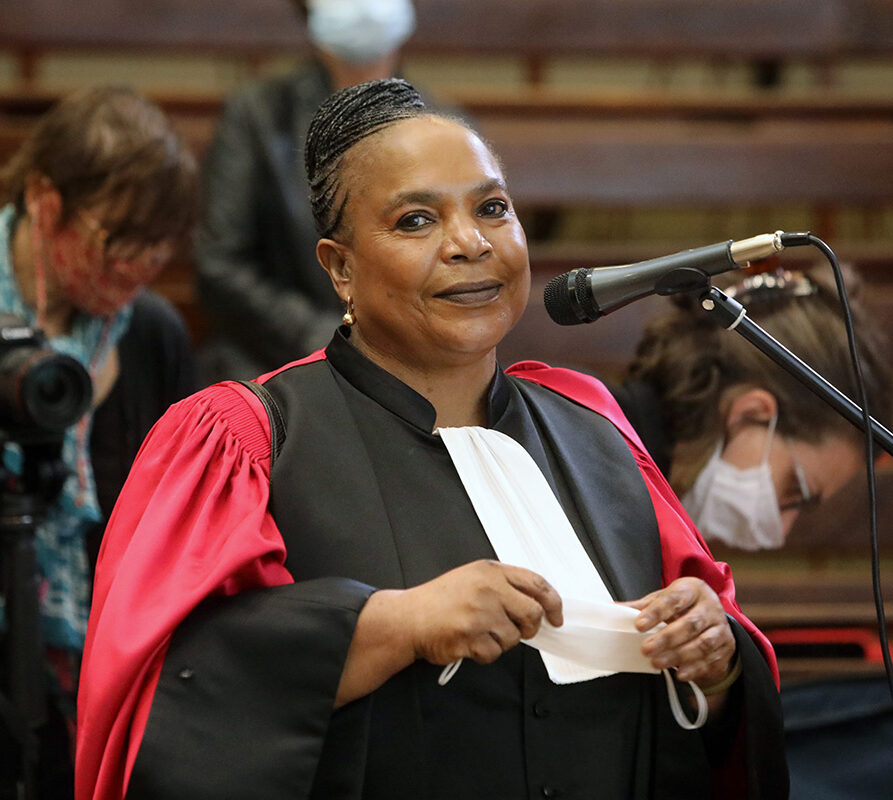Chipepo Kankasa, “the obsession with transmission”
It was on the recommendation of Montpellier professor Philippe Vande Perre that the University of Montpellier awarded an honorary doctorate to Zambian pediatrician Chipepo Kankasa last October. Unanimously recognized for her research on mother-to-child transmission of HIV, she is also the initiator of access to antiretroviral treatment for African children and prevention strategies in Zambia to combat HIV transmission through breastfeeding.

Wearing a red robe and a three-row epitoge on his shoulder, the man addressing the audience in English exchanges a knowing glance with his colleague, seated opposite him in the anatomy amphitheater of the historic medical building. Three years ago, Philippe Vande Perre, a researcher and doctor in Montpellier, made the following request to the University: "She [Chipepo Kankasa] has never received the international recognition that her remarkable life of commitment and struggle richly deserves. I hope that the University of Montpellier will right this injustice by awarding her an honorary doctorate." This has now been done, or almost done, on this October afternoon, which follows on from the Montpellier Global Days, where more than 2,000 African and French researchers have just gathered.
Thirteen years of collaboration
The story of Philippe Vande Peer and Chipepo Kankasa is the kind of story we love to hear in science. It is the story of a friendship that blossomed on the fringes of an international research program. The year is 2005. Philippe Vande Perre is director of the bacteriology and virology department at Montpellier University Hospital and has just joined the PROMISE consortium, which brings together European and African universities, including the University of Lusaka in Zambia. The aim of the project? To conduct intensive research into child health and mother-to-child transmission in the context of the HIV epidemic in Africa. "Fifteen years ago, the situation in Zambia was very difficult, with an infection rate of 25% among adults of childbearing age," explains the Montpellier native.
Within this consortium, he met Chipepo Kankasa. At the time, she was head of the pediatrics department at Lusaka University Hospital and a pioneer in the treatment of pediatric AIDS, thanks in particular to the brand-new center of excellence she had just founded. "As a doctor, researcher, African woman, and mother, she threw herself into the battle for the recognition of children's right to care and access to antiretroviral treatment at a time—the late 1990s and early 2000s—when skepticism about the merits of access programs in a context of poverty was widespread," recalls Philippe Vande Perre.
The major choices in my life
She recounts her journey as a doctor, researcher, African woman, and mother through a series of slides to her audience in Montpellier. Her childhood in a family highly recognized and respected for its pacifist struggle for Zambian independence. Her marriage at 19, the birth of her first son at 20, then two more before her divorce at 26. "The biggest decisions I made in my life were to entrust my sons to my mother so that I could pursue my medical studies and specialize in pediatrics," she recounts with emotion.
She initially pursued her studies in Zambia. She specialized in pediatrics at the University of Leningrad, then went on to specialize in infectious diseases in Japan. After returning to her native country for a year, she left again, this time for Miami, to do postdoctoral work on pediatric AIDS. In 1999, she returned to her country and began work that would demonstrate "the feasibility and effectiveness of treating pediatric HIV infection and would serve as the basis for the implementation of integrated care programs throughout Africa, in accordance with WHO recommendations," explains Philippe Vande Perre.
A career during the epidemic
Three extremely important studies on breastfeeding in the context of an AIDS epidemic will be published by this consortium and will result in nearly twenty scientific publications, whose impact on international recommendations for the prevention and management of HIV infection in children is well established. "Today, Zambia is one of the very few African countries that has almost succeeded in eliminating mother-to-child transmission of HIV, with a transmission rate of less than 5%," says the doctor.
In a context where the disease is still far from being eradicated, with 10% of adults of childbearing age still infected, the care of children infected with HIV has benefited from the immense work accomplished by the center of excellence founded by Chipepo Kankasa in 2005. "She is a strong and extremely determined woman. To establish this center, which is somewhat her life's work and, let's not forget, is unique in Africa, she knew how to knock on the right doors and convince major donors."
Obsession with transmission
This center, which specializes in pediatric AIDS care, now provides high-quality care to children infected with HIV and also serves as a training center for care providers. "She is obsessed with passing on her skills and has therefore trained many young colleagues who have gone on to become pediatricians and specialists in pediatric infectious diseases. It's a truly wonderful thing," observes her French colleague.
Now in the twilight of his clinical and academic career, Chipepo Kankasa is dedicated to raising the profile of his center in Lusaka and bringing together clinical and basic research within a single university hospital structure to pave the way for young researchers and healthcare professionals in his country. As she told UM's camera: "The sky's the limit."
